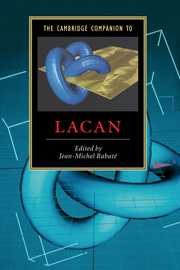Book contents
- Frontmatter
- 1 Lacan’s turn to Freud
- 2 The mirror stage: an obliterated archive
- 3 Lacan’s myths
- 4 Lacan’s science of the subject: between linguistics and topology
- 5 From the letter to the matheme: Lacan’s scientific methods
- 6 The paradoxes of the symptom in psychoanalysis
- 7 Desire and jouissance in the teachings of Lacan
- 8 Lacan and philosophy
- 9 Lacan’s Marxism, Marxism’s Lacan (from Žižek to Althusser)
- 10 Ethics and tragedy in Lacan
- 11 A Lacanian approach to the logic of perversion
- 12 What is a Lacanian clinic?
- 13 Beyond the phallus: Lacan and feminism
- 14 Lacan and queer theory
- 15 Lacan’s afterlife: Jacques Lacan meets Andy Warhol
- Further reading
- Index
- Series List
12 - What is a Lacanian clinic?
Published online by Cambridge University Press: 28 May 2006
- Frontmatter
- 1 Lacan’s turn to Freud
- 2 The mirror stage: an obliterated archive
- 3 Lacan’s myths
- 4 Lacan’s science of the subject: between linguistics and topology
- 5 From the letter to the matheme: Lacan’s scientific methods
- 6 The paradoxes of the symptom in psychoanalysis
- 7 Desire and jouissance in the teachings of Lacan
- 8 Lacan and philosophy
- 9 Lacan’s Marxism, Marxism’s Lacan (from Žižek to Althusser)
- 10 Ethics and tragedy in Lacan
- 11 A Lacanian approach to the logic of perversion
- 12 What is a Lacanian clinic?
- 13 Beyond the phallus: Lacan and feminism
- 14 Lacan and queer theory
- 15 Lacan’s afterlife: Jacques Lacan meets Andy Warhol
- Further reading
- Index
- Series List
Summary
Is there a Lacanian clinic? Undoubtedly. It is based on fidelity to the Freudian psychoanalytic method, a fidelity that, paradoxically, demands innovation. If Freudian psychoanalysis is a method of research and treatment of the psyche, it continues to be so in Lacan, although transformed. The psychoanalytic clinic employs the “talking cure,” and Lacan, like no one else, revolutionized the relationship between language and psychoanalysis. Free association is still the thread running through psychoanalytic practice, enriched thanks to a subverted linguistics. Its rationality is formalized and determined by the rule of free association, a process in which chance is rigorously harnessed. This program results in a freedom from any a priori determinism, whether biological or sociological, which would undermine the very exercise of psychoanalysis. The psyche to be cured is regarded as a subject-effect caused by the interplay of signifiers in the unconscious, a process that dissolves its supposed ego-like solidity, and, in a word, de-substantializes it. Therefore, the Lacanian clinic requires a complex conceptual battery, which may be discouraging for those who expect comfortable technical recipes. If there is one thing the apprentice psychoanalyst will not find, it is a recipe. Not only because a recipe would not be appropriate to the specificity of each unconscious, but because the unconscious and the subject it generates are deeply marked by the historicity which affects the exercise of psychoanalysis in each period, and which retroactively affects the unconscious itself.
- Type
- Chapter
- Information
- The Cambridge Companion to Lacan , pp. 208 - 220Publisher: Cambridge University PressPrint publication year: 2003



